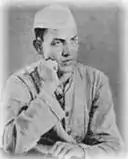Sri Dev Suman
Sri Dev Suman born Sri Dutt Badoni (25 May 1916 – 25 July 1944) was an Indian anti-monarchy social activist, freedom fighter and writer from the princely state Tehri Garhwal of British India (now District Tehri of Uttarakhand, India). Dev Suman is most renowned for his part in inspiring and leading non-violent Gandhian civil rights movements and eventual campaigns demanding the total abolition of the monarchy of Tehri.

Early life
Suman hailed from Tehri District of the now Indian state of Uttarakhand. He was born at Jaul village patti Bamund near the chamba city of Tehri Garhwal.
In 1938, Suman attended a political event organised in Srinagar by the district Congress Committee. Here, he had the opportunity to meet Jawaharlal Nehru and Vijaylaxmi Pandit. After meeting several political and social activists he decided to do something for people of Garhwal.[1]
Independence movement
During the Indian independence movement, Suman advocated that Tehri Riyasat be freed from the rule of the King of Garhwal. He was a staunch admirer of Gandhi and resolved to practice Gandhian methods of non-violent protests to struggle for the freedom of his beloved Tehri.[2]
Suman took up means of Gandhian Satyagrah and from the King of Tehri, Bolanda Badri, (speaking Badrinath), he demanded complete independence for Tehri. Suman organized multiple civil disobedience movements and served as the writer of many underground publications including the Suman Saurabh, which he edited.
Suman admired Gandhi and propagated his ideologies of non-violent struggle, and swadeshi in Tehri. Sundarlal Bahuguna, renowned for popularizing the chipko movement and also a devoted disciple of his , credits Suman for introducing the Tehri population to Gandhi, the Charkha and Nationalism.
Suman was also an active part of the pan India freedom movement against the British Raj. He took part in the “salt satyagraha” in 1930 in Dehradun, for which he was arrested and sentenced to a 15-day imprisonment. After seeking blessings from Gandhiji in Wardha, he attempted to return to Tehri to resume his Satyagrah there but was barred from entering and arrested every time he tried to do so.
On December 27, 1943, when he was trying to enter Tehri he was stopped at Chamba, arrested and locked up in Tehri jail on December 30, 1943, where he was subjected to inhuman torture.[3] He was heavily shackled and was given his food, which jailer Mohan Singh and others, had mixed with sand and stones.
On May 3, 1944, Suman launched his historic indefinite fast to protest the inhuman behavior of the jail authorities under the rule of the Tehri monarchs. His condition started deteriorating and by July 11 it became critical. Even then he resisted attempts at force feeding by the Jail authorities.
Death
Two hundred and nine days into his prison sentence for the last eighty four of which he had spent on a hunger strike, Sri Dev Suman perished [4] on 25 July 1944[5]
Local legends recount that the King of Tehri had Suman's corpse hung on a tree in Srinagar in a display of feudal power to deter other protestors. Before having his corpse was thrown into the Bhilangna River without a funeral.[6][7][8]
Legacy
Sri Dev Suman remains a popular political figure in the hills of Uttarakhand, most beloved in his native village. His name was also heavily evoked during the post-independence political protests for the statehood of uttarakhand.
In 2012, the Government of Uttarakhand through Pt. Deen Dayal Upadhyay Uttarakhand Vishwavidhyalaya Act, 2011[3] and its amendment . Deen Dayal Upadhyay Uttarakhand Vishwavidhyalaya (Amendment) Ordinance, 2012, changed the name of Pt. Deen Dayal Upadhyay Uttarakhand Vishwavidhyalaya to Sri Dev Suman Uttarakhand University (SDSUV).
SDSUV is a State university situated at Badshahithaul in Tehri Garhwal district of north Indian state of Uttarakhand, India.
References
- Rawat, Hansa. "Sri Dev Suman – The Valiant Soul of Garhwal".
- Weber, Thomas (2004). Gandhi as disciple and mentor. Cambridge University Press. p. 184. ISBN 978-0-521-84230-3.
- "Garhwal remembers Dev Suman". [The Tribune]. 26 July 2016.
- Kumar, Pradeep (2000). The Uttarakhand movement: construction of a regional identity. Kanishka Publishers. p. 53. ISBN 978-81-7391-357-0.
- "Sri Dev Suman: The Hero of Garhwal". The Indian Hawk. Retrieved 2 July 2020.
- "Aaj Ka Pahad, Himalaya, Uttrakhand: Sri Dev Suman, श्री देव सुमन". 5 February 2009.
- "Nainitalsamachar.in".
- Hāṇḍā, Omacanda (2002). History of Uttaranchal. ISBN 8173871345.